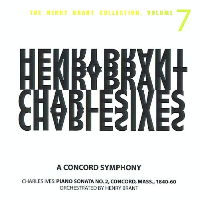
Powerful and Original
Music by Ives,
orchestrated by Brant,
and heard by
ROBERT ANDERSON
Innova innova 414
|

|
This is an orchestration by Henry Brant of Charles Ives's Piano Sonata No 2, Concord Mass., 1840-60. Ives worked long at the sonata, incorporating material from 1904, and producing a revised edition of the published work in 1947. There are in the sonata hints for a possible future orchestration in that there is an optional viola part near the end of the first movement, and in the finale a brief appearance for flute. But Brant's magisterial achievement, which was equally long in gestation (1958-94), is of course an entirely original conception of the piece, a viable and impressive addition to the concert repertoire.
The core inspiration for the sonata was the foundation by Ralph Waldo Emerson of the Transcendental Club in 1836, also the date of his first essay, Nature. 'Make the most of yourself,' he urged. He has claim to the sonata's first movement. The Scherzo is Nathaniel Hawthorne's, author of The Scarlet Letter, near neighbour to Emerson, and owner of the house previously belonging to Amos Bronson Alcott, pioneer of radical education, and his literary daughter Louisa May, subjects of the third movement. Henry David Thoreau presides over the finale, thought by Hawthorne to have a face 'as ugly as sin'. He did indeed play the flute. All five characters were staunch abolitionists and therefore controversial, proper subjects for Charles Ives.
The keyboard coped easily with the sheer grit that Ives could so readily command; but the lyrical passages benefit greatly from orchestral continuity, and dynamic effects such as the long dying fall near the end of Emerson's movement become the more impressive. Ives starts the work in full knowledge he too will excite controversy.
Listen -- Ives/Brant: Emerson
(track 1, 0:00-1:33) © 2007 American Composers Forum
Hawthorne's humour is conveyed in the squeaks and gibbers that launch the Scherzo. But soon enough the clashing brass bands of Ives's native Danbury Square make their impact.
Listen -- Ives/Brant: Hawthorne
(track 2, 0:02-1:36) © 2007 American Composers Forum
The 'Hillside' home of the Alcotts is invoked in the lovely intertwining of the wind instruments at the start of their movement, a mood maintained as the strings take over, but rudely interrupted by the protests of stamping brass.
Listen -- Ives/Brant: The Alcotts
(track 3, 0:01-1:42) © 2007 American Composers Forum
Thoreau, author of the seminal essay Civil Disobedience, begins with delicate textures suggesting profound but vaguely subversive ideas. His energy, though, is soon brusquely in evidence.
Listen -- Ives/Brant: Thoreau
(track 4, 5:40-7:19) © 2007 American Composers Forum
Brant's reward should be the wide dissemination of a very powerful and original work, with many advocates as convincing as the fine players of the Royal Concertgebouw Orchestra under Dennis Russell Davies.
Copyright © 25 November 2008
Robert Anderson, Cairo, Egypt
 BUY CLASSICAL CDS ONLINE
CD INFORMATION: IVES/BRANT: A CONCORD SYMPHONY
MALCOLM TATTERSALL INVESTIGATES THE MUSIC OF HENRY BRANT
CHARLES IVES: CONCORD SONATA AND SONGS
PHILIP MEAD PLAYS MUSIC BY CHARLES IVES
JENNIFER PAULL: IVES AND THE ESTABLISHMENT
BUY CLASSICAL CDS ONLINE
CD INFORMATION: IVES/BRANT: A CONCORD SYMPHONY
MALCOLM TATTERSALL INVESTIGATES THE MUSIC OF HENRY BRANT
CHARLES IVES: CONCORD SONATA AND SONGS
PHILIP MEAD PLAYS MUSIC BY CHARLES IVES
JENNIFER PAULL: IVES AND THE ESTABLISHMENT
Record Box is Music & Vision's
regular series of shorter CD reviews
| 
